KEYNOTE SPEAKERS
Keynote Bios
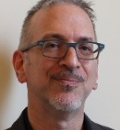 Ross Cagan, PhD
Ross Cagan, PhD
Senior Associate Dean for the Graduate School of Biomedical Sciences, Icahn School of Medicine at Mount Sinai, USA
Ross L. Cagan, PhD, is Professor of the Department of Developmental and Regenerative Biology and Director of the Center for Personalized Cancer Therapeutics. He is also Senior Editor of Disease Models and Mechanisms and co-founder of Medros Inc.
Dr. Cagan's laboratory focuses on the use of Drosophila to address disease mechanisms and therapeutics, primarily for cancer. Their work helped validate vandetanib as a therapeutic for Medullary Thyroid Carcinoma, combined Drosophila genetics and medicinal chemistry to develop a new generation of lead compounds that emphasize "balanced polypharmacology", and identified novel mechanisms that direct transformed cells into the first steps towards metastasis.
Combining these basic research approaches, Dr. Cagan has established the Center for Personalized Cancer Therapeutics, in which new tools including 'personalized Drosophila avatars' are developed and used to screen for personalized drug cocktails. Working with co-directors Marshall Posner and Eric Schadt, the CPCT is designed to treat patients with drug combinations that best address the tumor's complexities.
A Fly DREAM
A key challenge in many diseases including cancer and neurodegenerative diseases is their complexity. Genomic changes and interactions within a whole body setting can lead to emergent properties that present significant therapeutic challenges. In our DREAM challenge, the community has worked to develop new approaches to developing therapeutic candidates that embrace complexity.
 Aravinda Chakravarti, PhD
Aravinda Chakravarti, PhD
Professor of Medicine, Pediatrics, Molecular Biology & Genetics, and Biostatistics and Neuroscience, New York University School of Medicine, USA
Dr. Aravinda Chakravarti is Professor of Medicine, Pediatrics, Molecular Biology & Genetics, and Biostatistics and Neuroscience at the New York University School of Medicine, and inaugural Director of its Center for Human Genetics and Genomics. He was the 2008 President of the American Society of Human Genetics, and has been elected to the U.S. National Academy of Science, the U.S. National Academy of Medicine, the Indian National Academy of Sciences, and the Indian Academy of Sciences. He has been a key participant and architect of the Human Genome, HapMap, and 1000 Genomes project. His research is aimed at genome-scale analysis of humans and computational analysis of gene variation and function to understand the molecular genetic basis of complex human disease. For his contributions to human genetics and genomics he was awarded the William Allan Award in 2013 by the American Society of Human Genetics. Aravinda Chakravarti received his doctoral degree in human genetics in 1979 and started his faculty career at the University of Pittsburgh (1980–1993), was the James H. Jewell Professor of Genetics at Case Western Reserve University (1994-2000), and the inaugural Director and Henry J. Knott Professor of the McKusick-Nathans Institute of Genetic Medicine at Johns Hopkins (2000-2007). He is one of the founding Editors-in-Chief of Genome Research and Annual Reviews of Genomics & Human Genetics, and serves on the boards of numerous private Institutes and charities, international journals, academic societies, the NIH and biotechnology companies.
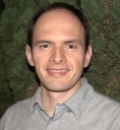 Peter Kharchenko, PhD
Peter Kharchenko, PhD
Assistant Professor of Biomedical Informatics, Harvard University, USA
Peter Kharchenko received a PhD in biophysics at Harvard University, studying gene regulation and metabolic networks under the advisement of George Church. He then completed a four-year postdoctoral fellowship in computational biology and genomics in the laboratory of Peter Park. His lab specializes in development of statistical and computational methods for analysis of genomic data, including single-cell genomics, as well as application of these approaches to studies of normal and cancer tissue organization.
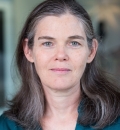
Daphne Koller, PhD
Stanford University, USA
Daphne Koller (PhD) is the CEO and Founder of insitro, a startup company that aims to rethink drug development using machine learning. She also co-founded and led Coursera, the largest platform for massive open online courses (MOOCs). Daphne was the Rajeev Motwani Professor of Computer Science at Stanford University, where she served on the faculty for 18 years. She has also been the Chief Computing Officer of Calico, an Alphabet company in the healthcare space. She is the author of over 200-refereed publications appearing in venues such as Science, Cell, and Nature Genetics. Daphne was recognized as one of TIME Magazine’s 100 most influential people in 2012 and Newsweek’s 10 most important people in 2010. She has been honored with multiple awards and fellowships during her career including the Sloan Foundation Faculty Fellowship in 1996, the ONR Young Investigator Award in 1998, the Presidential Early Career Award for Scientists and Engineers (PECASE) in 1999, the IJCAI Computers and Thought Award in 2001, the MacArthur Foundation Fellowship in 2004, and the ACM Prize in Computing in 2008. Daphne was inducted into the National Academy of Engineering in 2011 and elected a fellow of the American Academy of Arts and Sciences in 2014 and of the International Society of Computational Biology in 2017. Her teaching was recognized via the Stanford Medal for Excellence in Fostering Undergraduate Research, and as a Bass University Fellow in Undergraduate Education.
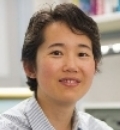 Xiaole Shirley Liu
Xiaole Shirley Liu
Professor of Statistics, Biostatistics, and Computational Biology, Harvard University, Dana-Farber Cancer Institute, USA
Xiaole Shirley Liu received PhD in Biomedical Informatics and PhD minor in Computer Science from Stanford University in 2002. She is now Professor of Statistics, Biostatistics and Computational Biology at Harvard University, Director of the Center of Functional Cancer Epigenetics at Dana-Farber Cancer Institute, associate member of the Broad Institute, and Visiting Professor of Bioinformatics at Tongji Univ. She is a member of the ENCODE consortium and the lead investigator for the Cancer Immune Data Common from National Cancer Institute. Her research focuses on algorithm development and integrative modeling of high throughput genomic data to understand the specificity and function of regulator genes in tumor development, progression, drug response and resistance. She is especially interested in genomics and bioinformatics approaches in cancer epigenetics, cancer immunology, and CRISPR screens for translational cancer research. Her lab developed widely used analysis algorithms for transcription factor motif discovery, ChIP-chip/seq, CRISPR screen, and tumor immune repertoire data analysis. Her computational modeling helped the understanding of ER, AR, FoxA1, XBP1, JARID1B, PBAF regulation as well as BET bromodomain inhibitor, gamma secretase inhibitor, CDK4/6 inhibitor, and immune checkpoint inhibitor function in different cancers in different cancers. Dr. Liu has an H-index of 79 according to Google Scholar statistics and has published over 50 papers in Nature, Science or Cell series journals. She is the recipient of the Sloan Research Fellowship, the Richard E. Weitzman Outstanding Early Career Investigator Award from the Endocrine Society, the Claire W. and Richard P. Morse Research Award, the Breast Cancer Research Foundation Investigator, the Yangtze River Scholar and 1000 Talent Scholar in China. She has successfully mentored sixteen trainees to start tenure track faculty positions.
Hidden immunology signals in tumor RNA-seq
Tumor RNA-seq data contain rich information about the tumor immune microenvironment. I will discuss two computational algorithms TIDE and TRUST developed in our lab.
Cancer treatment by immune checkpoint blockade (ICB) can bring long-lasting clinical benefits, but only a fraction of patients respond to treatment. To predict ICB response, we developed TIDE, a computational method to model two primary mechanisms of tumor immune evasion: the induction of T cell dysfunction in tumors with high infiltration of cytotoxic T lymphocytes (CTL) and the prevention of T cell infiltration in tumors with low CTL level. We identified signatures of T cell dysfunction from large tumor cohorts by testing how the expression of each gene in tumors interacts with the CTL infiltration level to influence patient survival. We also modeled factors that exclude T cell infiltration into tumors using expression signatures from immunosup- pressive cells. Using this framework and pre-treatment RNA-Seq or NanoString tumor expression profiles, TIDE predicted the outcome of melanoma patients treated with first-line anti-PD1 or anti-CTLA4 more accurately than other biomarkers such as PD-L1 level and mutation load. TIDE also revealed new candidate ICB resistance regulators, such as SERPINB9, demonstrating utility for immunotherapy research.
Tumor-infiltrating B cell is an important component in the microenvironment with unclear anti-tumor impacts. We enhanced our previous computational algorithm TRUST to extract the B cell immunoglobulin (Ig) hypervariable regions from bulk tumor RNA-seq data. TRUST assembled over 30 million complementarity-determining region 3 (CDR3s) of the B cell heavy chain (IgH) from The Cancer Genome Atlas (TCGA). Widespread B cell clonal expansions and Ig subclass switch events were observed in diverse human cancers. Prevalent somatic copy number alterations (SCNA) in MICA/B genes related to antibody-dependent cell mediated cytotoxicity (ADCC) were identified in tumors with elevated B cell activity. IgG3-1 subclass switch interacts with the B cell receptor affinity maturation and defects in the ADCC pathway. The comprehensive pan-cancer analyses of tumor-infiltrating B cell receptor repertoires revealed novel tumor immune evasion mechanism through genetic alterations. The IgH sequences identified in this work are potentially useful resources for future development of immunotherapies.
 Miriam Merad, PhD
Miriam Merad, PhD
Icahn School of Medicine at Mount Sinai, USA
Miriam Merad, M.D.; Ph.D. is the Mount Sinai Chair professor in Cancer Immunology and the Director of the Precision Immunology Institute at Mount Sinai School of Medicine in New York.
Dr. Merad obtained her MD at the University of Algiers, Algeria. She did her residency in Hematology and Oncology in Paris, France and obtained her PhD in immunology in collaboration between Stanford University and University of Paris VII. She was recruited to Mount Sinai in 2004 and was promoted to the rank of Associate Professor with Tenure in 2007 and to Full Professor in 2010 and in 2014, she obtained an Endowed Chair Professor in Cancer Immunology.
Dr. Merad’s laboratory studies the contribution of macrophages and dendritic cells to Cancer and Inflammatory disease in mice and Human. Dr. Merad’s pioneering work mapping the regulatory network of dendritic cells (DCs) resulted in identification of a lineage of DC, the CD103+ DC, that is now considered a key target to improve antiviral and antitumor immunity. Another of her key discoveries is that, contrary to the previously-held beliefs that monocytes are precursors of macrophages, she found that tissue-resident macrophages in fact arise from embryonic precursors that take residence in tissues prior to birth and are maintained independently of adult hematopoiesis. These insights are now being used to develop novel macrophage and dendritic cell-specific targets for the treatment of Cancer and Inflammatory diseases. Dr. Merad has authored more than 160 primary papers and reviews in high profile journals. Dr. Merad receives generous funding from the National Institutes of Health (NIH) for her research on innate immunity and their contribution to human disease, and belongs to several NIH consortia. She is an elected member of the American Society of Clinical Investigation, and lectures around the world on her work.
Single Cell Approaches To Guide Novel Diagnostics And Precise Therapies
Immunological diseases arise from a complex interplay of genetic and environmental factors favoring tissue-damaging responses. Although many genetic susceptibility loci have been linked to these diseases, genetic information have failed to predict disease course or disease response to treatment.
Here I will discuss how single cell approaches are helping dissect disease heterogeneity, identify prominent pathophysiological processes and novel therapeutic avenues. I will also discuss novel single cell approaches that combine proteomics and RNAseq at the single cell level and how these approaches are strongly enhancing genomic data and our understanding of disease pathophysiology.
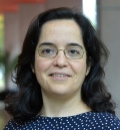 Ana Pombo, PhD
Ana Pombo, PhD
Berlin Institute for Medical Systems Biology, at the Max Delbrueck Center, Germany
Ana Pombo investigates how the 3D folding of chromosomes influences gene expression in mammalian development and disease, and epigenetic mechanisms that prime genes for future activation. She received her DPhil from University of Oxford (1998, UK) where she identified transcription factories in mammalian nuclei. She was awarded a Royal Society Dorothy Hodgkin Fellowship (UK; 1998-2002), and started leading her research group in 2000 at the MRC London Institute for Medical Sciences, Imperial College London (UK). Her laboratory moved to the Berlin Institute for Medical Systems Biology, at the Max Delbrueck Center (Berlin, Germany) in 2013, and she was appointed Professor (W3) at Humboldt University of Berlin. Her lab has developed Genome Architecture Mapping (GAM), an exquisite technology to map the 3D structure of chromosomes genome-wide. GAM is uniquely powerful to quantify the higher-order complexity of 3D genome and the study of rare cell types directly from tissue, avoiding dissociation, including from precious human biopsies. These developments open a huge field of potential applications to identify the
genes affected by disease-associated genetic variants present in non-coding parts of the genome, through long-range chromatin contacts.
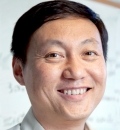 Bing Ren, PhD
Bing Ren, PhD
Professor of Cellular and Molecular Medicine, UC San Diego, USA
Dr. Ren is Member of the Ludwig Cancer Research (LCR), Professor of Cellular and Molecular Medicine at the University of California, San Diego (UCSD), and Director of the UCSD Center for Epigenomics. Dr. Ren obtained his Ph.D. from Harvard University in 1998, and subsequently conducted postdoc research at the Whitehead Institute. He joined the faculty at LCR and UCSD in 2001, and was promoted to Associate Professor in 2007 and to Full Professor in 2009. Dr. Ren is studying how gene expression is regulated in mammalian cells, and how its dysregulation leads to cancer and other human disease. His lab has developed transformative tools and concepts for global analysis of transcriptional control elements and chromatin organization. He is a recipient of the Chen Award for Distinguished Academic Achievement in Human Genetic and Genomic Research, and an elected fellow of the American Association for the Advancement of Science.
Functional Organization of the Human Genome
The 3-dimentional architecture of chromosomes in eukaryotic cells enables long-range communication between enhancers and promoters, and contributes to spatiotemporal gene expression programs in multicellular species. Detailed knowledge of how chromatin architecture dynamically reorganizes during development and in different cell types is critical for studying the gene regulatory programs controlling cell fate specification and elucidating the molecular basis of human diseases. We have delineated the dynamic chromatin architecture at high resolution during key developmental stages of human cardiomyocyte differentiation from embryonic stem cells. We observed dramatic changes in chromatin compartments, topological domains and enhancer/promoter interactions, which was correlated with dynamic gene expression patterns. The chromatin loop interactions help us to predict target genes of non-coding genetic variants associated with cardiac-related traits/diseases. We also generate maps of long-range chromatin interactions centered on human promoters in a large panel of human cell/tissue types. We use this information to infer the target genes of candidate regulatory elements, and suggest potential regulatory function for non-coding sequence variants associated with a large number of physiological traits and diseases. Integrative analysis of these promoter-centered interactome maps reveals widespread enhancer-like promoters involved in gene regulation and common molecular pathways underlying distinct groups of human traits and diseases.
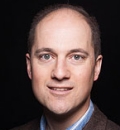 Adam Siepel, PhD
Adam Siepel, PhD
Professor, Watson School of Biological Sciences
Chair, Simons Center for Quantitative Biology
Cold Spring Harbor Laboratory, USA
Adam Siepel is a Professor in the Watson School of Biological Sciences and Chair of the Simons Center for Quantitative Biology at Cold Spring Harbor Laboratory, with adjunct appointments at Cornell University and Stony Brook University. Originally trained as a computer scientist, Siepel has done influential work in molecular evolution, human population genetics, and transcriptional regulation. He was a member of the faculty of the department of Biological Statistics and Computational Biology at Cornell University from 2006-2014 and has been at Cold Spring Harbor Laboratory since 2014. Siepel is a winner of a Guggenheim Fellowship, a Microsoft Research Faculty Fellowship, a Packard Fellowship, a National Science Foundation CAREER Award, and a Sloan Research Fellowship.
An evolutionary framework for measuring epigenomic information and estimating cell-type specific fitness consequences
How much information do epigenomic data sets provide about human genomic function? We have addressed this question by considering nine epigenomic features across 115 cell types from the Roadmap Epigenomics project. We measure information about function as a reduction in entropy under a probabilistic evolutionary model fitted to human and nonhuman primate genomes. We find that several epigenomic features yield more information in combination than they do individually, and that the entropy in human genetic variation predominantly reflects a balance between mutation and neutral drift. Our cell-type specific FitCons scores reveal relationships among cell types and suggest that ~8% of nucleotide sites are constrained by natural selection.
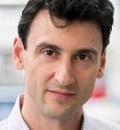 Itai Yanai, PhD
Itai Yanai, PhD
Director, Institute for Computational Medicine
Professor, Biochemistry and Molecular Pharmacology
New York University, School of Medicine, USA
Dr. Itai Yanai joined the faculty at New York University’s School of Medicine in May 2016 as a professor in the Department of Biochemistry and Molecular Pharmacology. He serves as the inaugural director of the Institute for Computational Medicine (ICM), whose goal is to harness computational approaches for fundamental and medically-relevant discoveries. Through the development of novel tools, the nurturing of young investigators, and translational applications, ICM aims to create a culture that promotes scientific advancements.
Dr. Yanai’s research focuses on the interface of gene expression, development, and evolution. Using his training as an experimental embryologist, a molecular biologist, and a computational biologist, his interest is exploring how developmental pathways evolve at the molecular level. Members of his lab carry out intricate embryological experiments at the level of individual cells and apply computational approaches to explore the resulting data. As a model system, they use the best understood animal, the nematode C. elegans. His lab developed the popular CEL-Seq method for single-cell RNA-Seq and they have used it to study stages, germ-layers, and body-plans in animal embryos. More recently, his lab is applying single-cell RNA-Seq to the study of tumorigenesis and bacterial infection.
Dr. Yanai received his undergraduate degrees in Computer Engineering and the Philosophy of Science and his PhD in Bioinformatics from Boston University in 1997 and 2002, respectively. He completed a postdoctoral fellowship in Molecular Genetics in 2004 at the Weizmann Institute of Science in Israel and a postdoctoral fellowship in Developmental Genetics at Harvard University in 2008. At the Technion–Israel Institute of Technology, he served as an Assistant Professor in the Department of Biology from 2008-2013 and Associate Professor from 2014-2016. He was a Radcliffe Fellow, Radcliffe Institute for Advanced Study, Harvard University, and a visiting professor, Broad Institute of Harvard and MIT, from 2014-2015.
In addition to his research goals, Dr. Yanai firmly believes that the communication of knowledge is a major component of science and is involved in mentoring students, giving presentations, participating in outreach programs and in the dissemination of science to a popular audience. Towards this end, Dr. Yanai has also co-authored a popular science book, entitled “The Society of Genes”, along with Dr. Martin Lercher from Heinrich-Heine University in Düsseldorf.
Single-cell and spatial gene expression analysis of tumorigenesis






